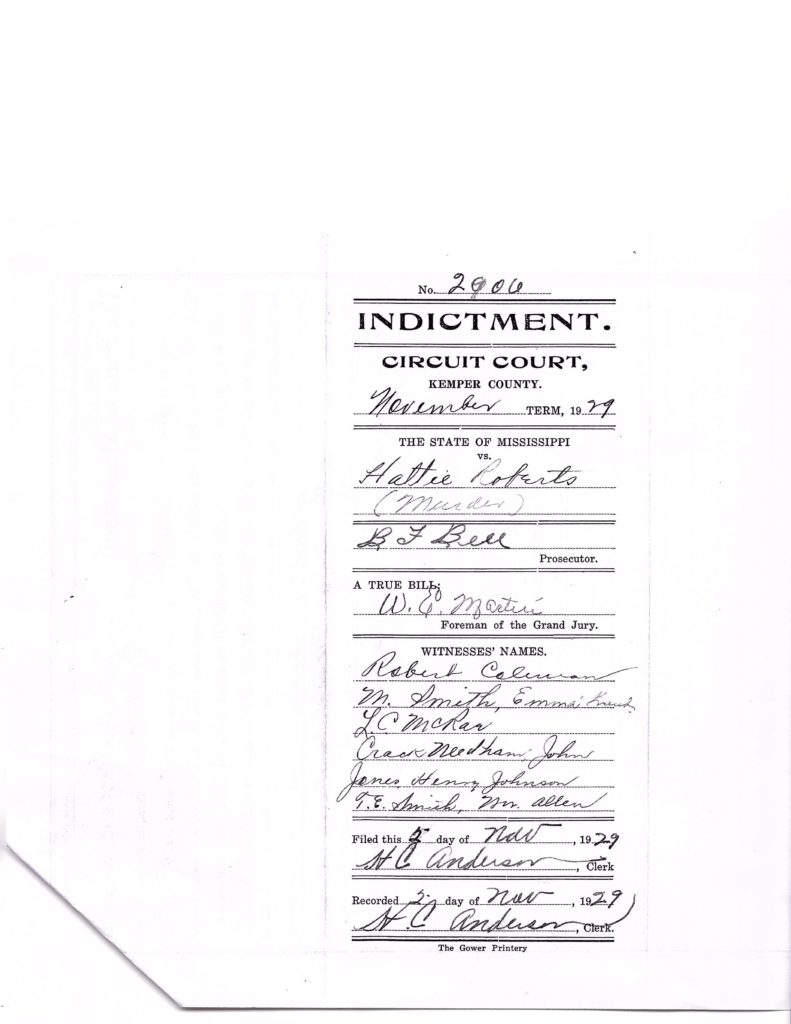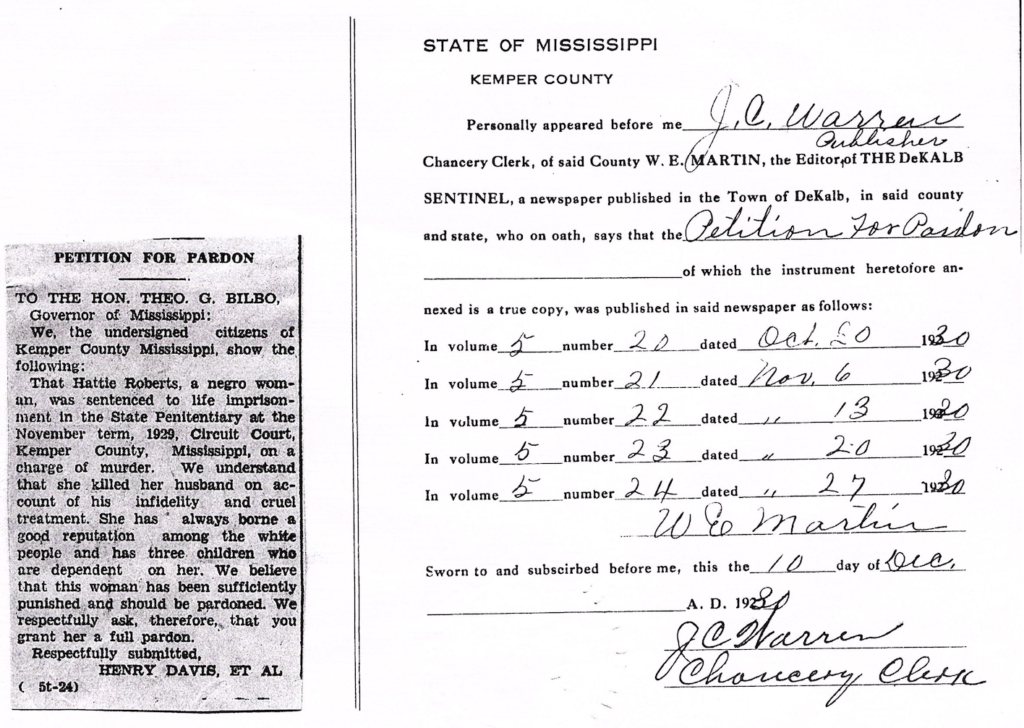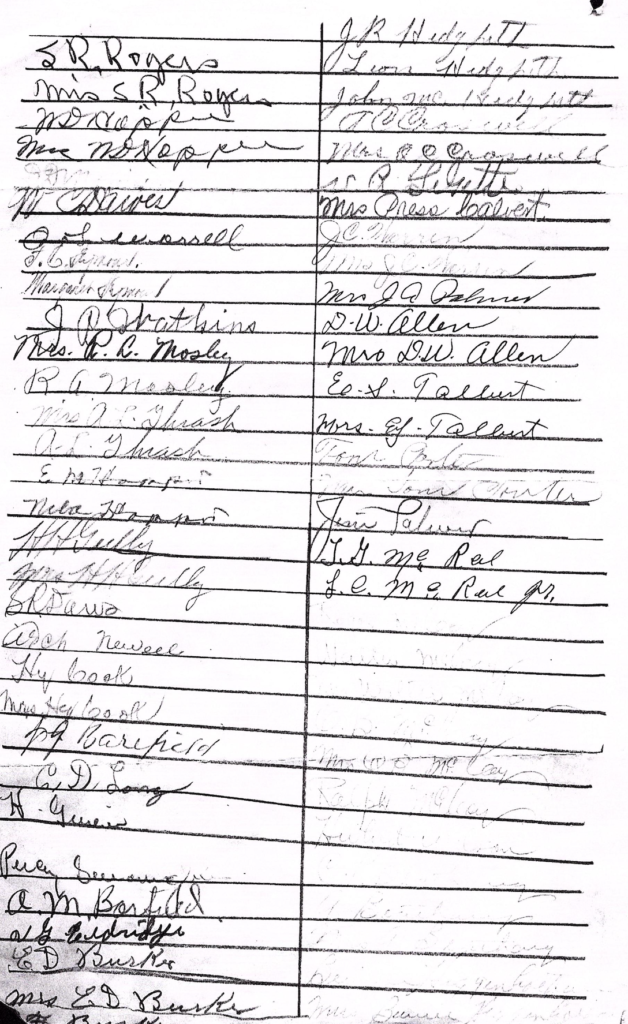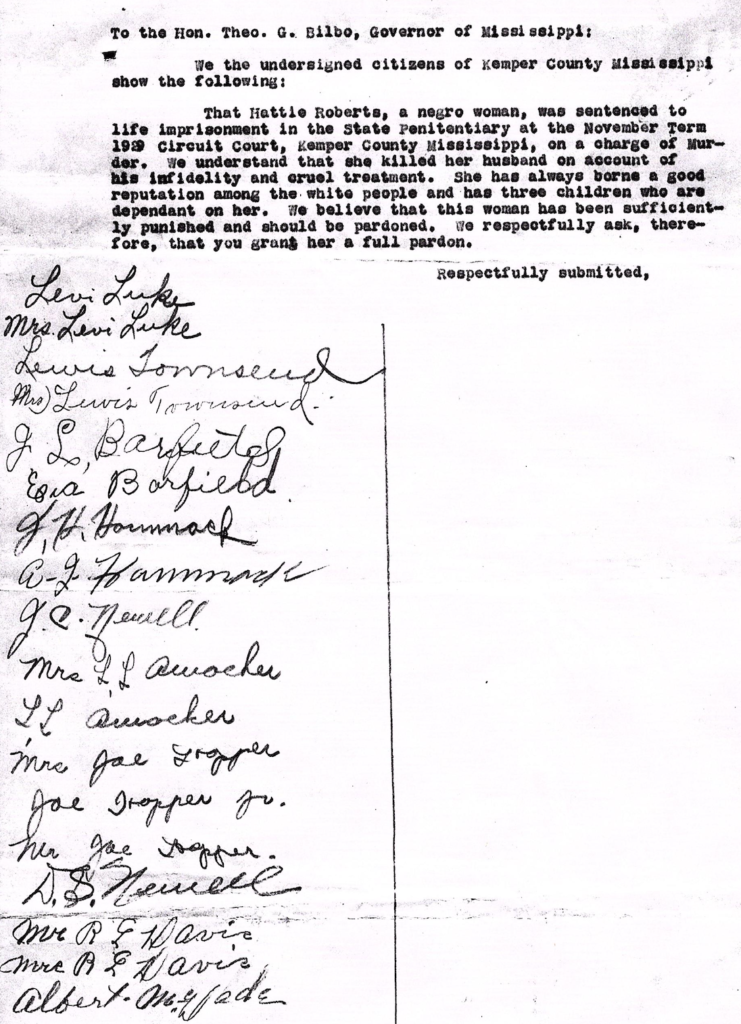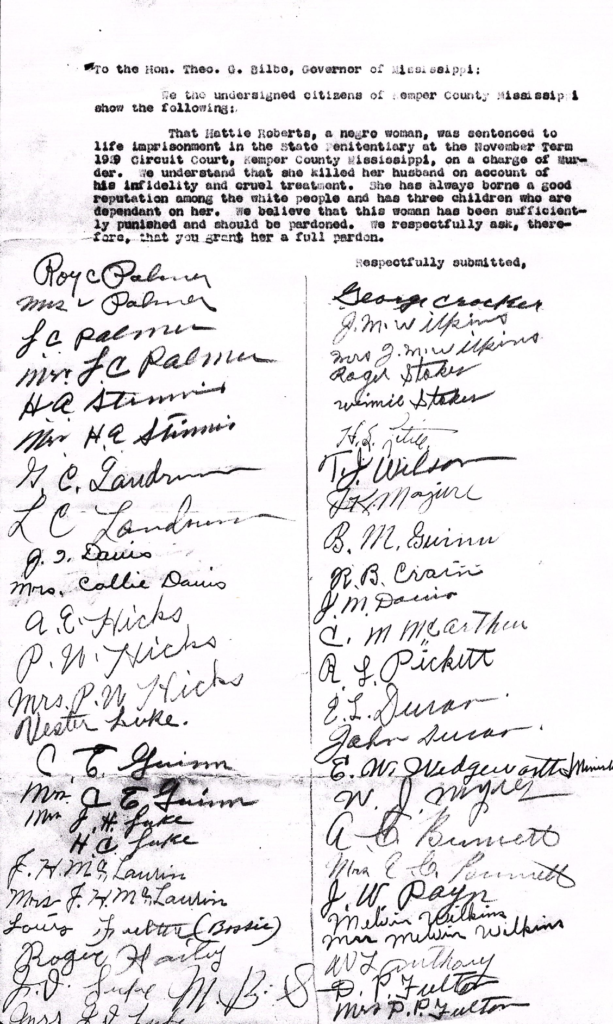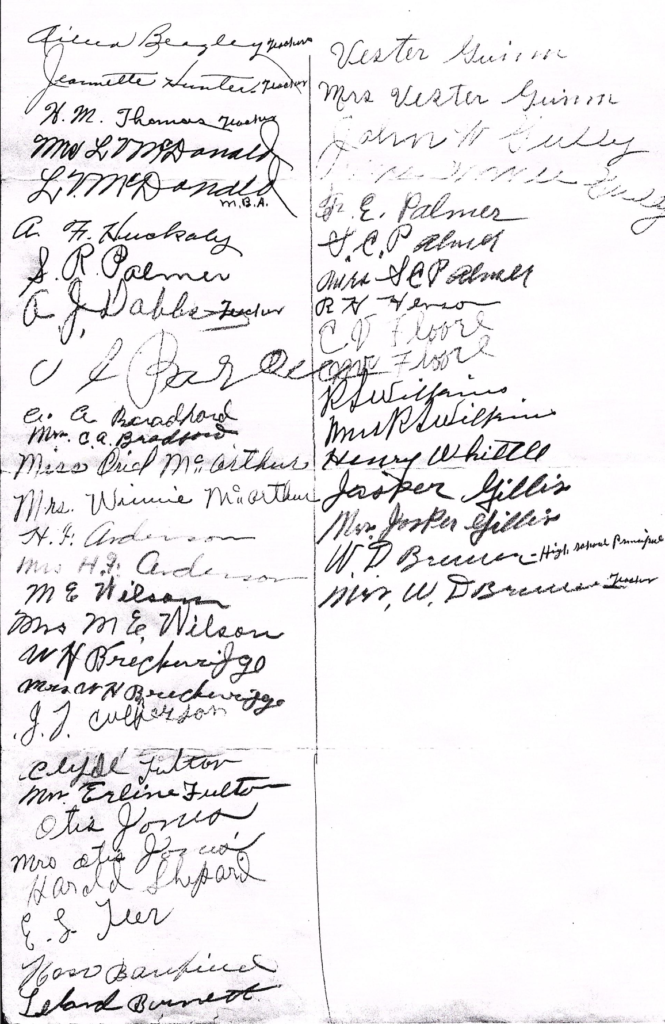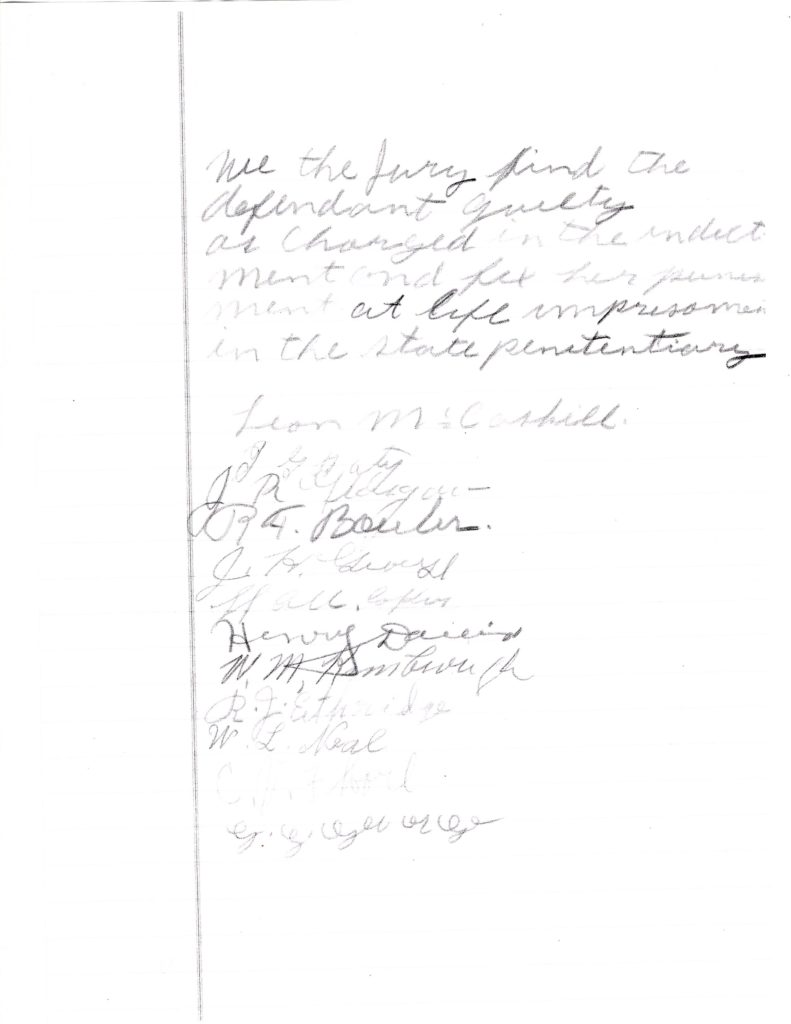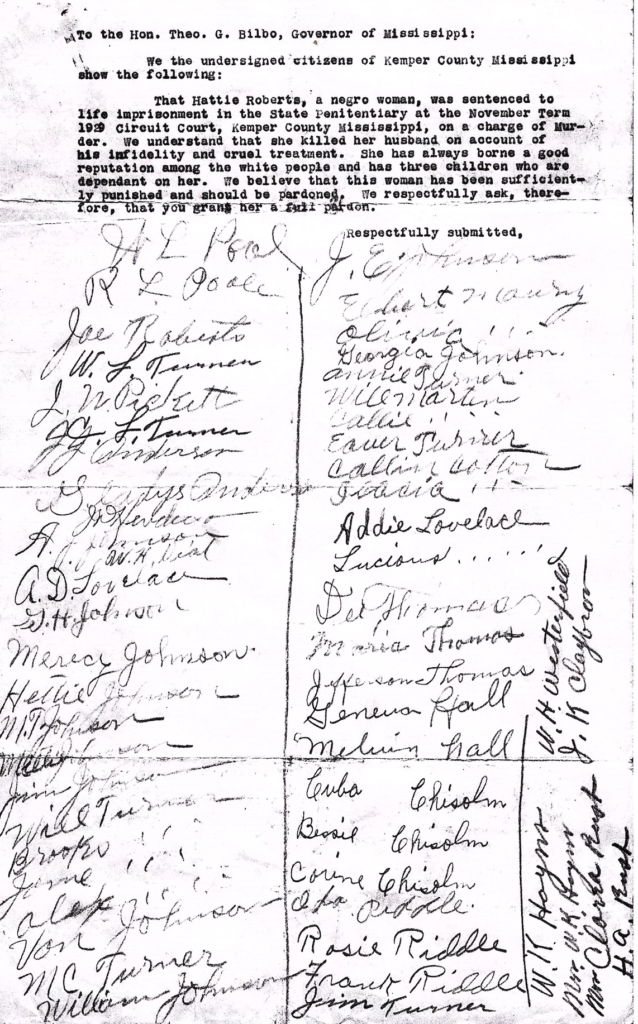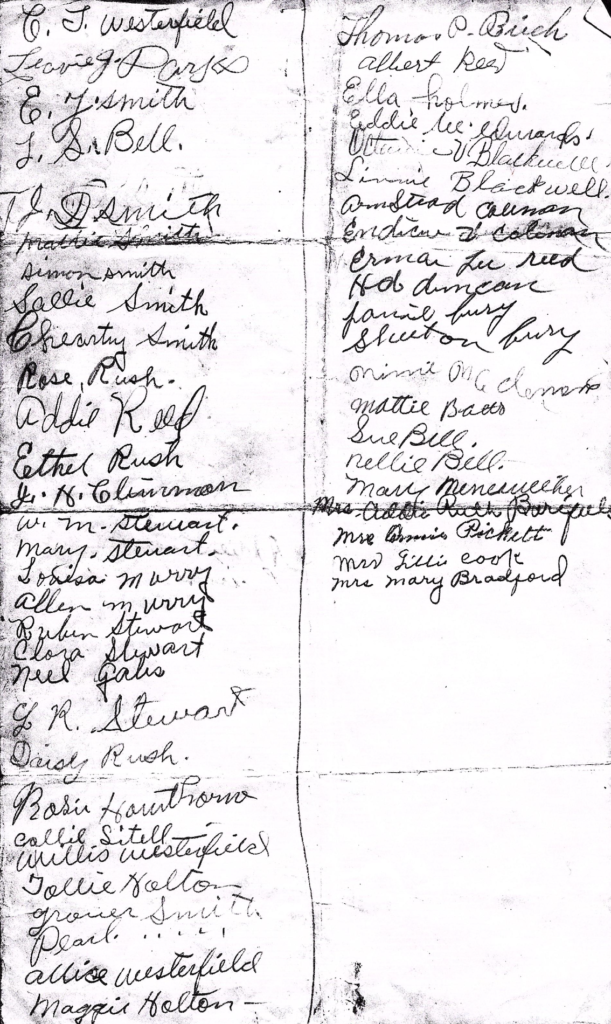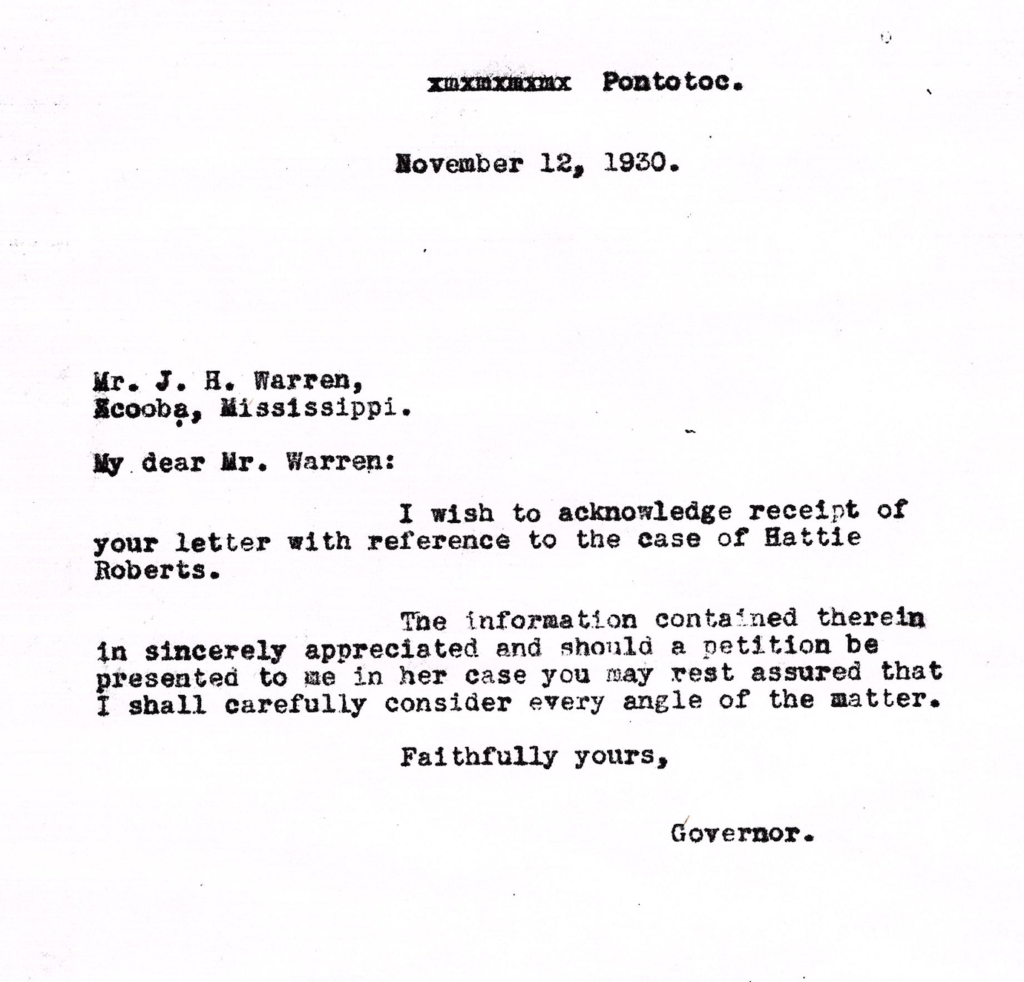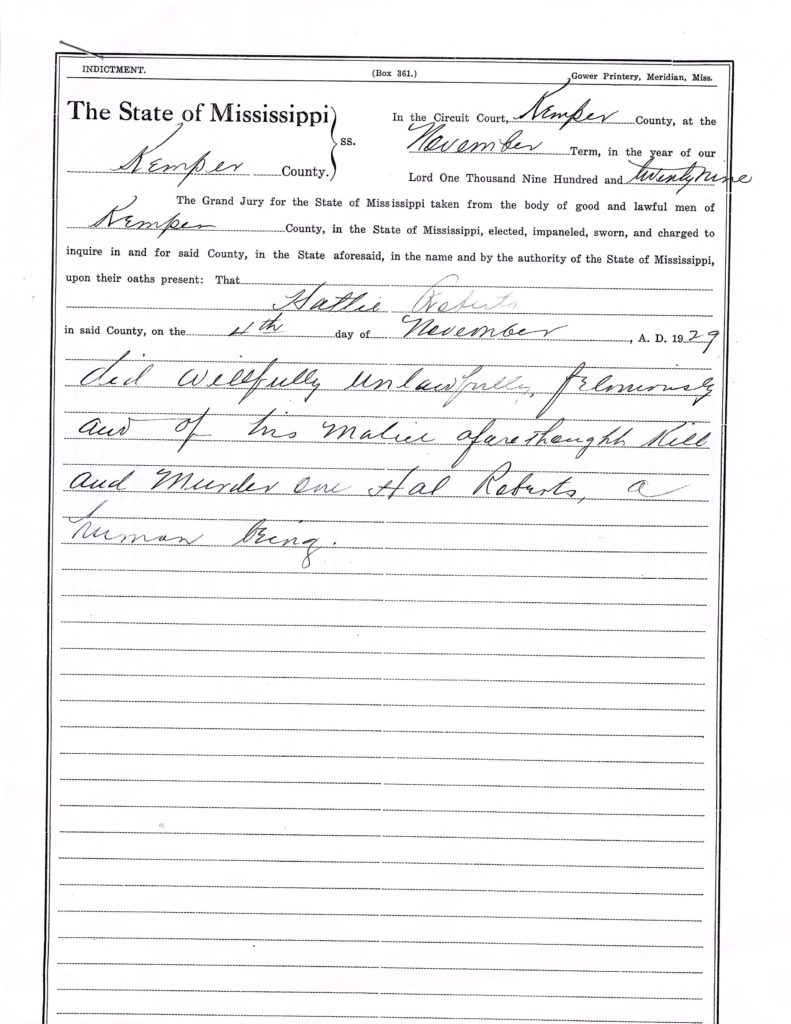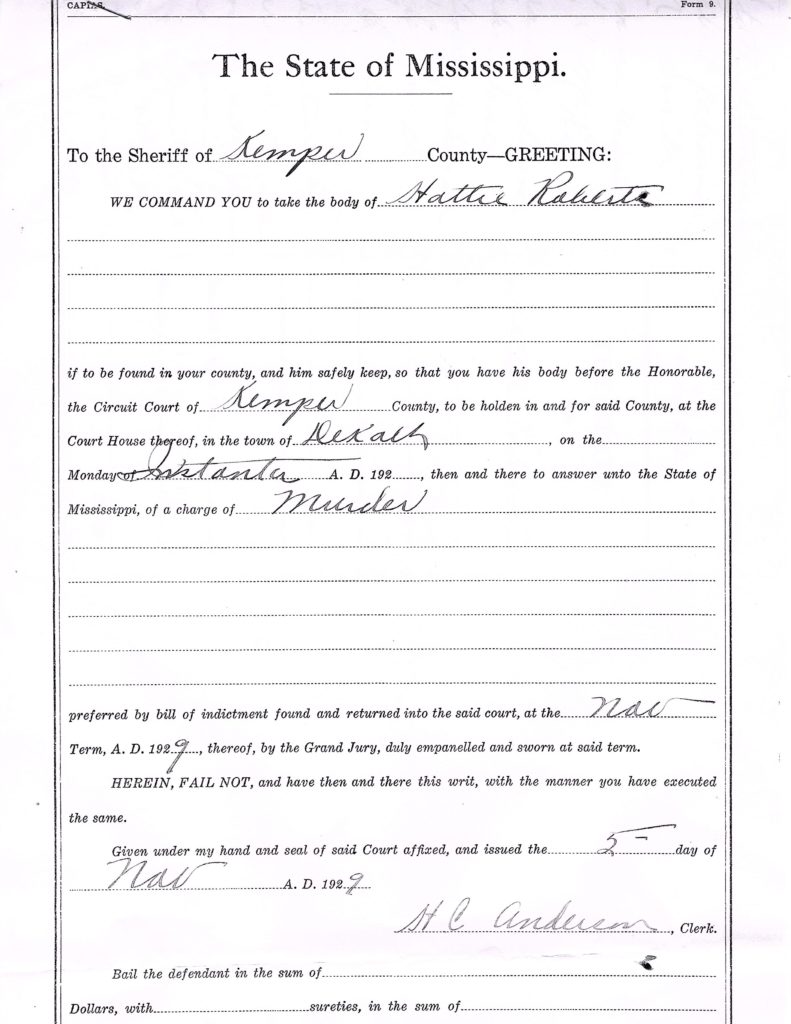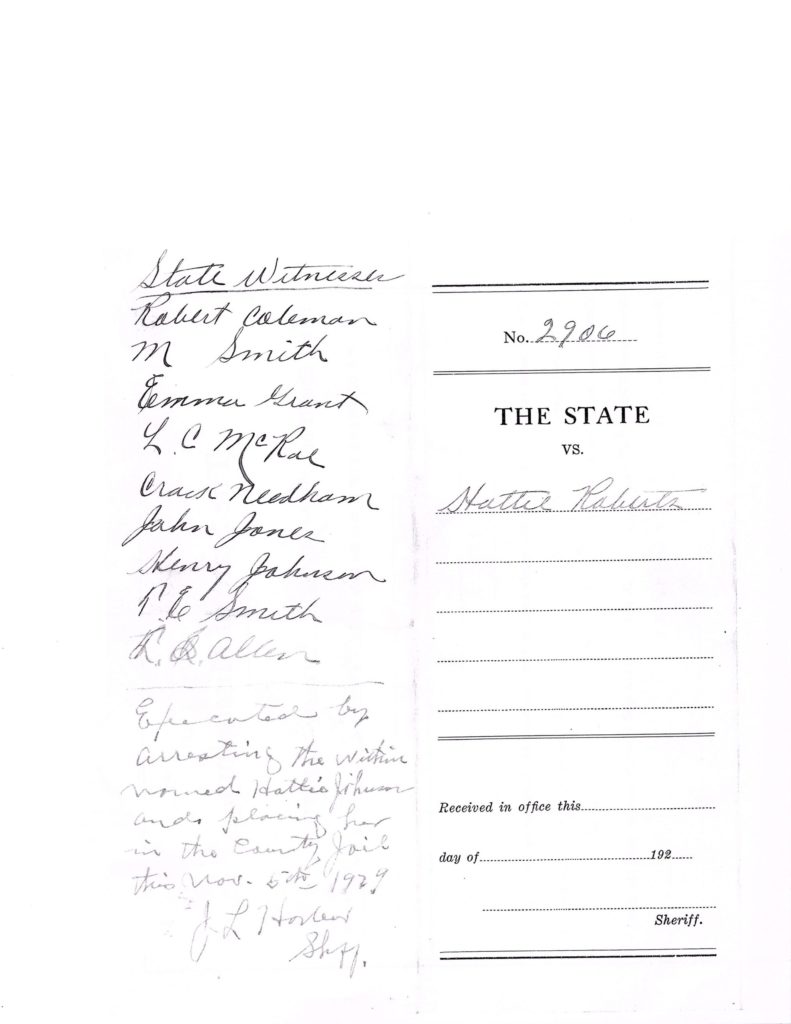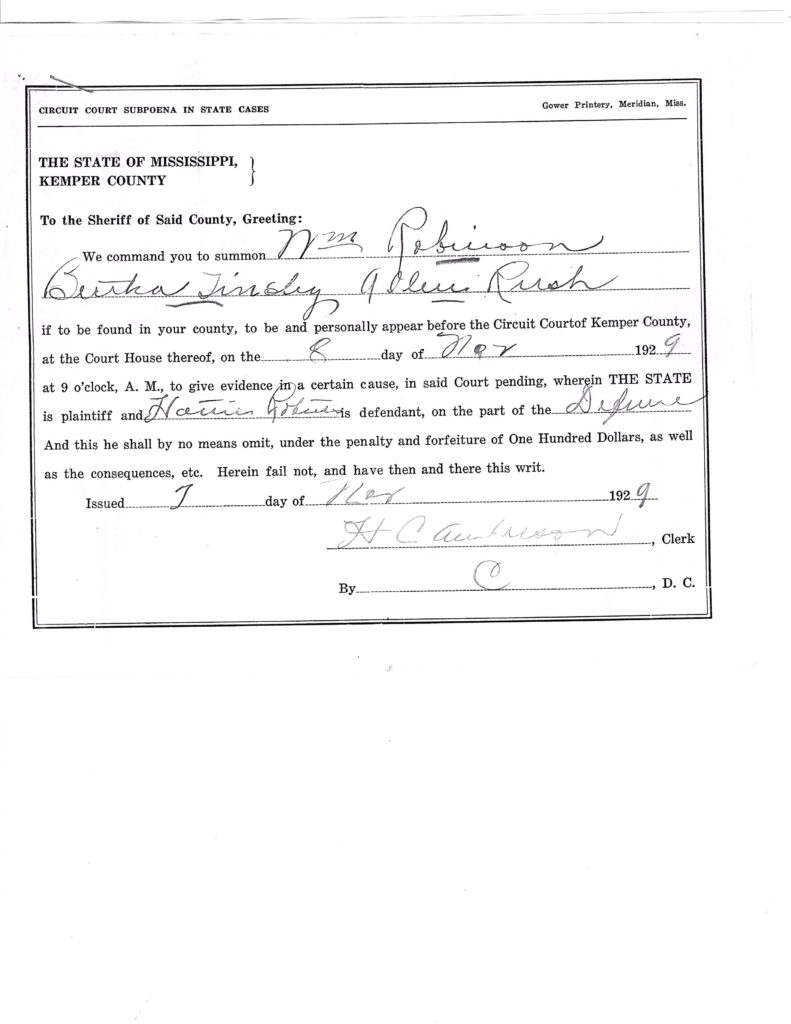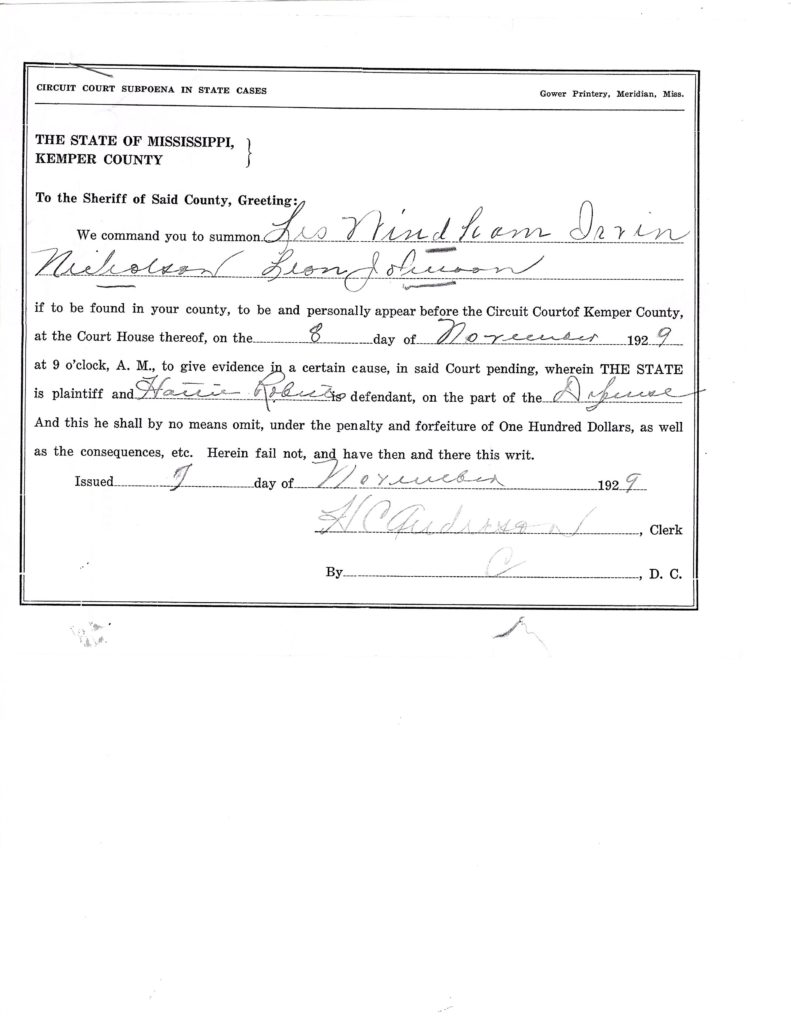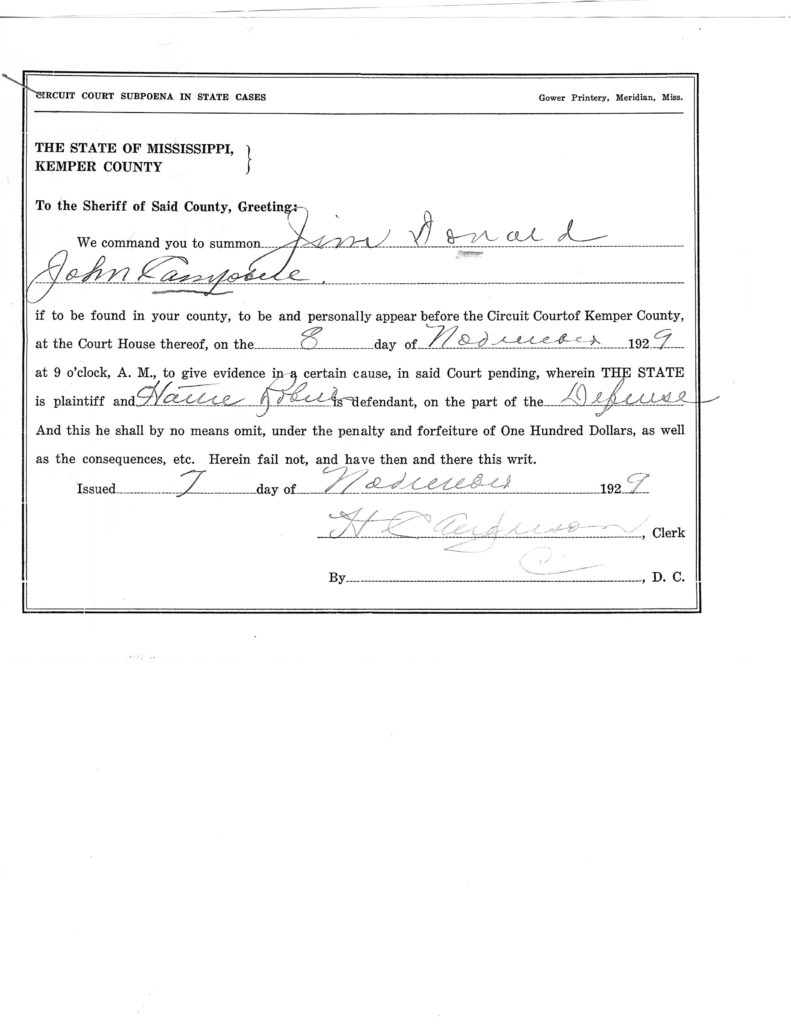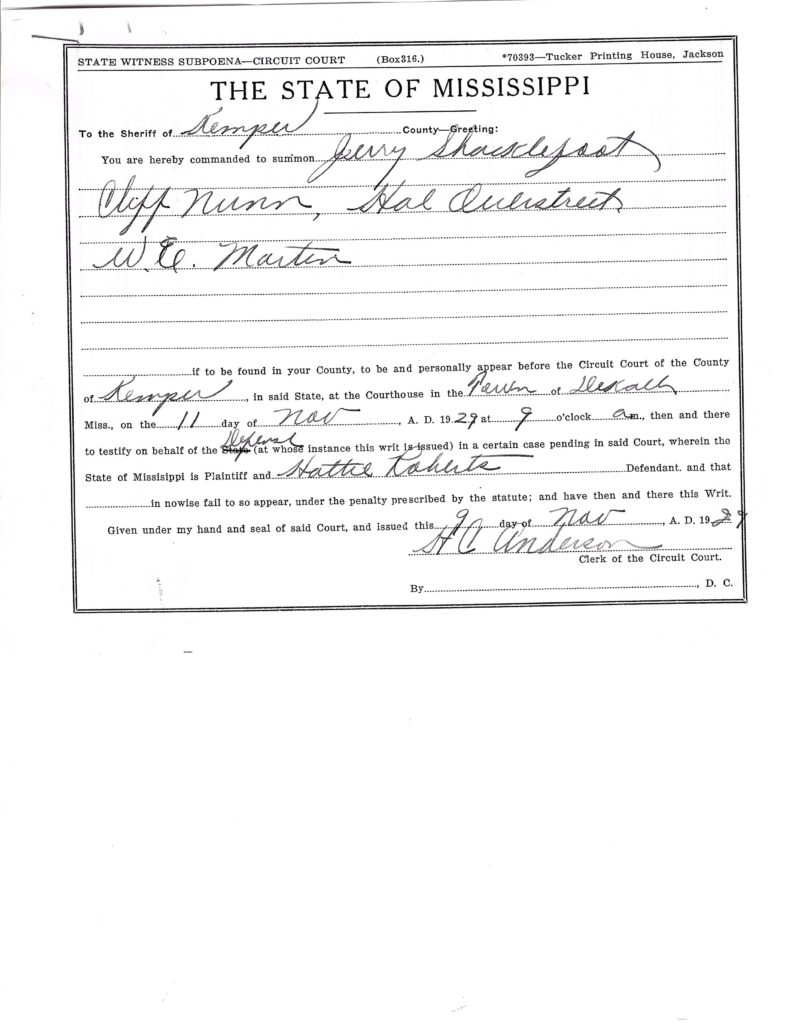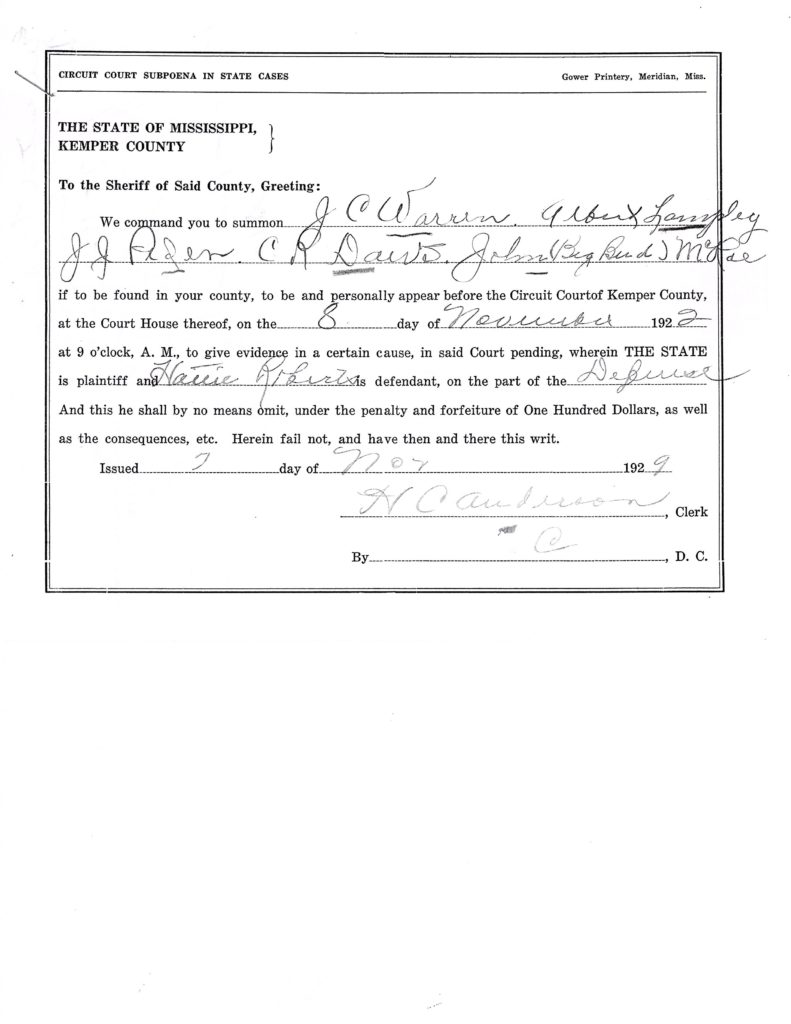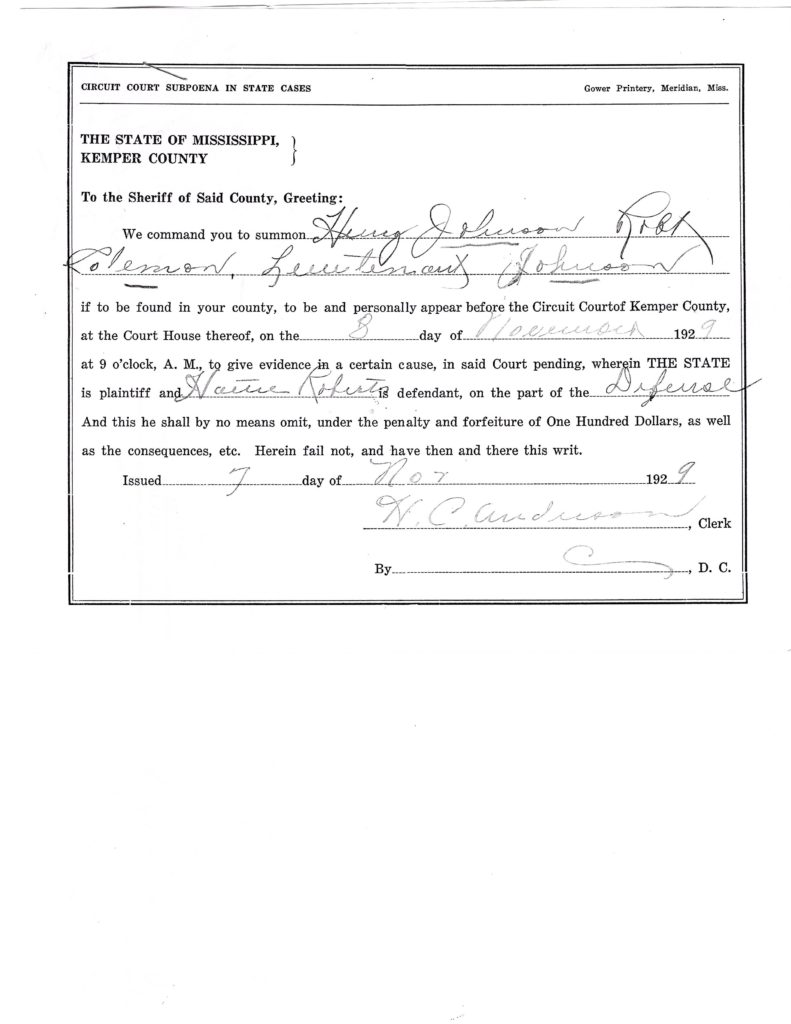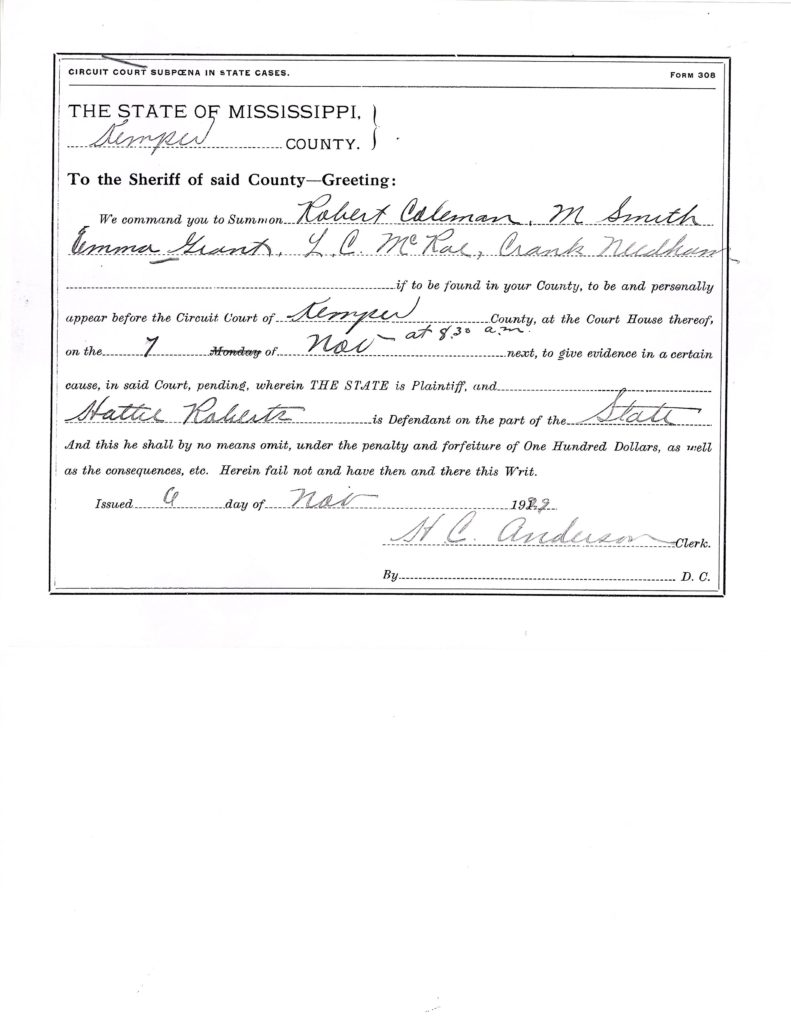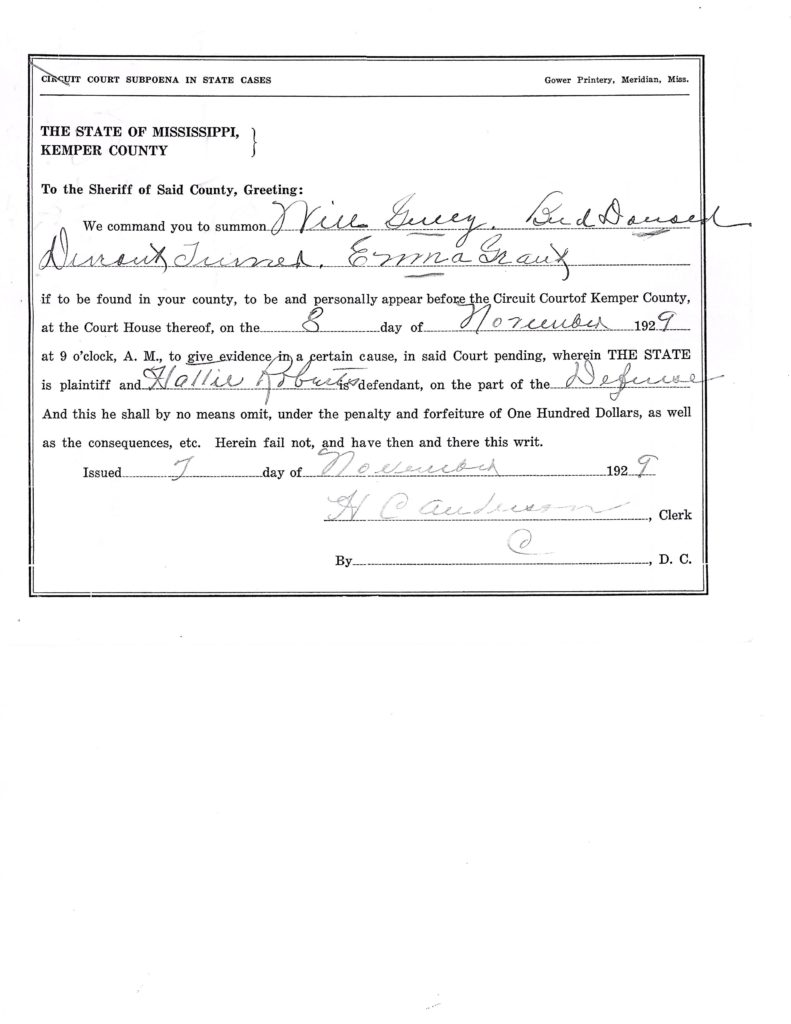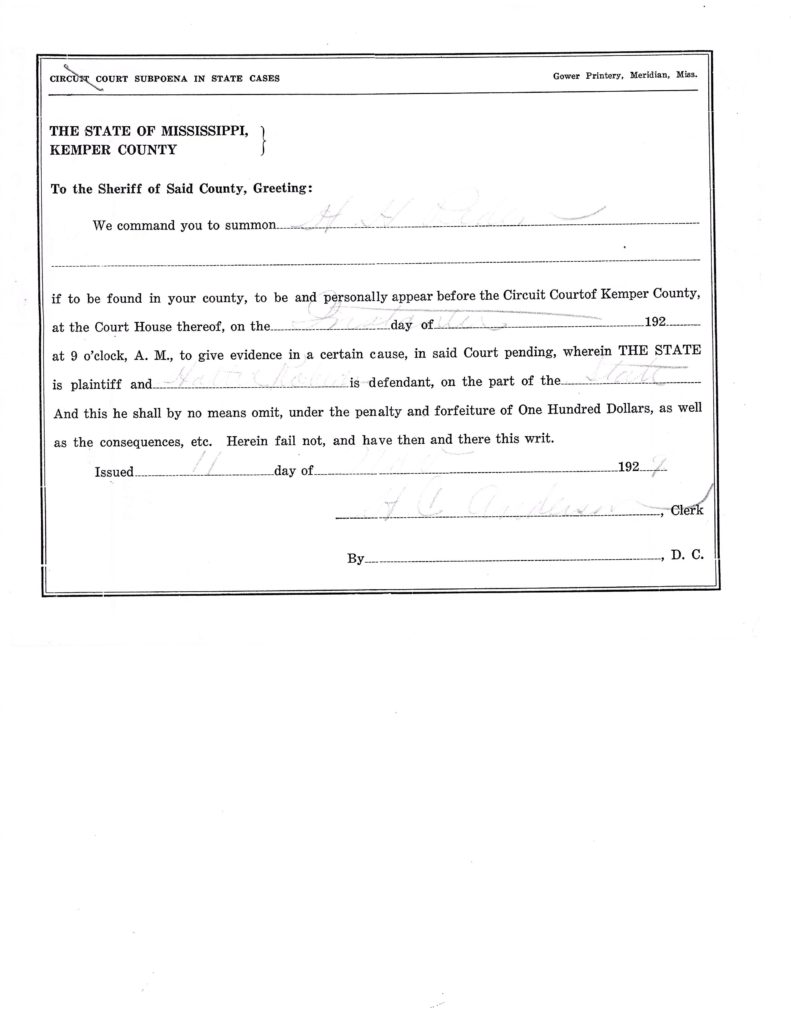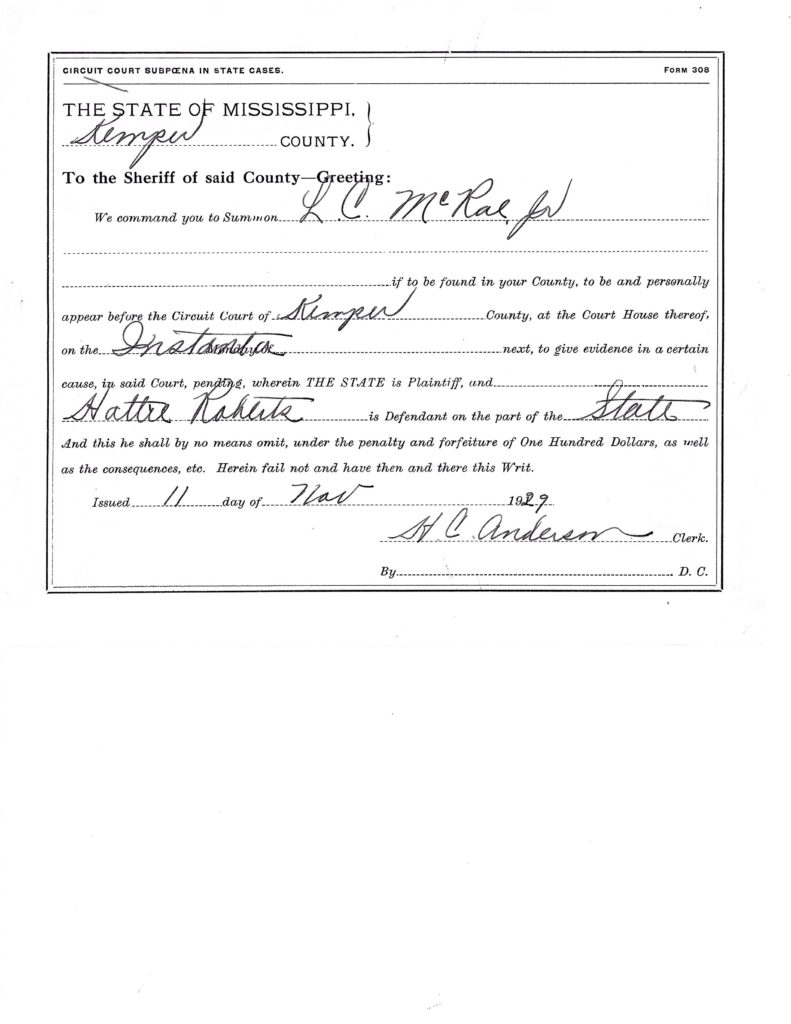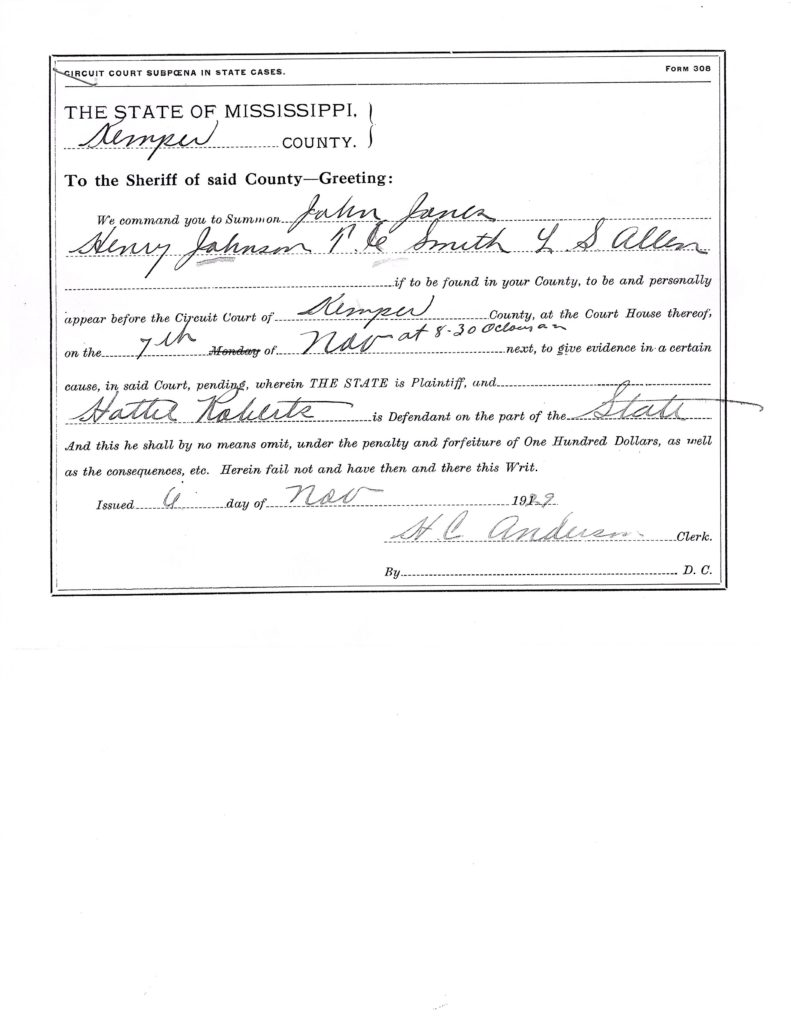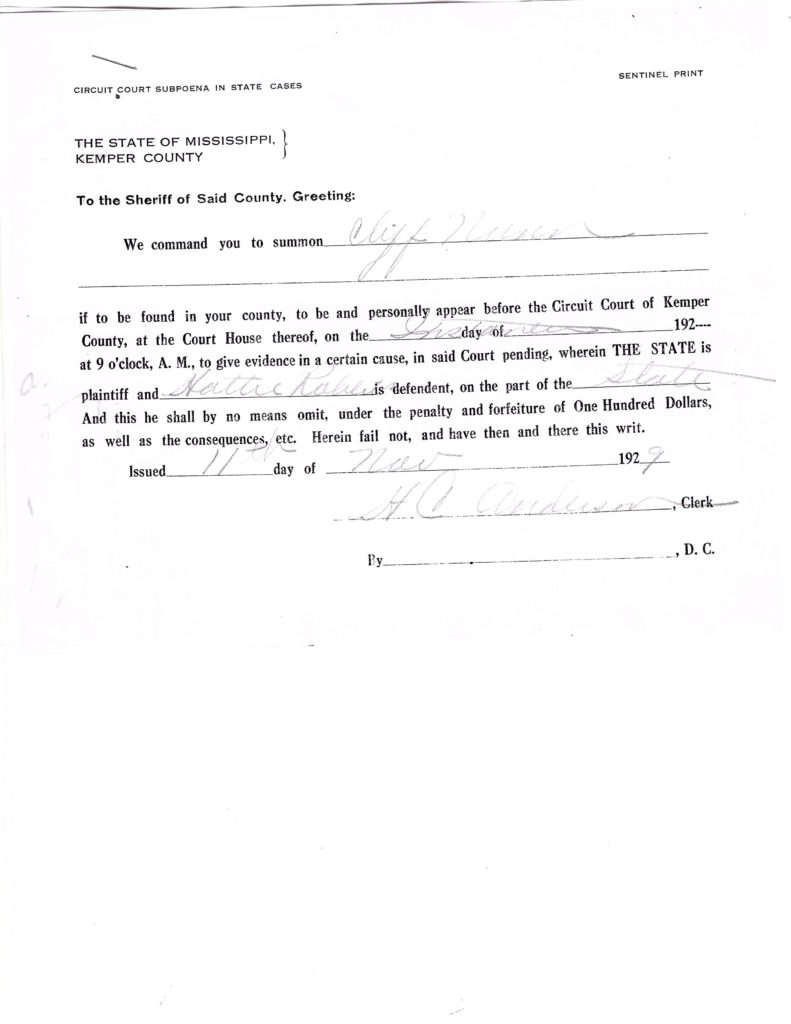The Pardon of Murderess Hattie Johnson Roberts
by Elaine Perryman

Stories of murder and success in family history conjure up feelings of excitement at the expense of the subject. We all gravitate to the extreme whether it is claiming a celebrity cousin five times removed or in this article a murderess blasting her husband for being scorned. We can claim a celebrity and quickly let go of the status that intrigued us because the connection to family surpasses the stars in our eyes. Can we forgive a murderess with the same feeling of family commitment? The answer is easily yes if decades of time have passed and the cause is righteous.
When I first heard of our cousin Hattie Johnson killing her husband I was working on the history of her father William Johnson born a slave in 1850 Alabama and his descendants. I was trying to firm up a few facts and reached out to Gloria Hollins W. I had never spoken to Gloria and received her contact information through another cousin, Alice Fulton P. During the course of our conversation Gloria shared about Hattie Johnson and how she murdered her husband.
Gloria jokingly said, “My mother had Hattie babysit me as a child and what mother allows a convicted murderer be by her child, haha ? “
We laughed knowing there was more to the story of Hattie somewhere.That’s when I went to work trying to find out the details! It was not an easy find.
The actual trial records are missing and it is figured that someone took the file or buried it in another file as it was not found in the Kemper Circuit Court archives. Although the pre-trial documents were found there and the post-trial ones at the Mississippi Archives in Jackson, MS.
I have posted what was found below for your perusal. The papers give supporting evidence to Hattie’s defense and casts a reality check to the “hear me roar” fabrication in our minds.
Our Hattie Eva Johnson was born in Kemper County, Mississippi in February of 1895 according to the 1900 census [1]. In 1910 her birth is listed as 1894 [2]. She was the tenth child born of William Johnson (His birth, June 1850 in Pickens County, Alabama and death, February 3, 1914 in Kemper County, Mississippi) [3] and the eldest child of Ellen Walker, Will’s second wife.
We do know that her father William died in 1914 and her mother’s demise is unknown as she disappears from documents prior to 1920 and the younger children are scattered living with relatives in Arkansas and Mississippi.
The first appearance of Hattie in records after 1910 is in the Kemper County Colored Marriage books. Hattie Johnson is listed as married to a Harold Roberts on October 27, 1917. [4]. A previous suspected marriage to Anthony Robinson does not appear in records due to a courthouse fire prior to 1912.

Harold Roberts records are even more scarce. Assumptions need to be made based on geography and age. In looking at a Harold’s WW1 registration card we find a farmer living at the family farm in DeKalb, MS. He is marked as having a medium height and build with black eyes and black hair. His nearest relative is Hattie Roberts. His wife? Or his mother of the same name and location? The information ends here. He is not found in the 1920 census nor is Hattie and her children as of yet.
According to post trial documents, Hattie had three or four children [6]:
- Bertha Lee Robinson born May 1, 1912 and died September 23, 1990 [7]
- William Henry Robinson born November 22, 1913 and died on his sister’s birthday, May 1, 1973 [8]
Hattie appears in the 1927 Mississippi enumeration of children as the parent registering two of her brothers, Lieutenant born about 1909 and a Johnson born about 1911 [9] Also, registering Bertha 14 yrs. and William 12 yrs. A Hal Roberts lists a William 15yrs. and a Charlie 11yrs. in 1927.
Another child may be J.B. Roberts born about 1920 as listed in the 1931 enumeration under Hattie Roberts but I have no further proof. [10]
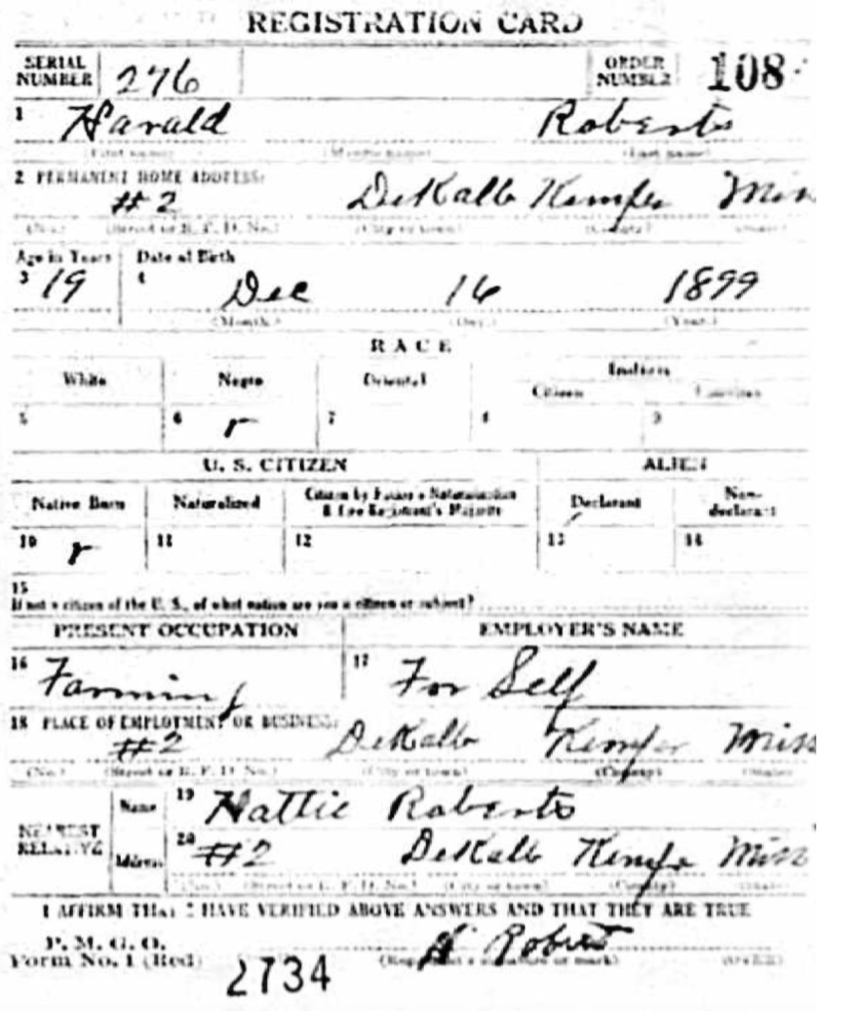




The father of Bertha Lee as noted on her U.S. Social Security Applications and Claims is Anthoney Robinson. [11] This coincides with William Henry’s death index listing his surname as Robinson. This figures as a previous marriage.
At this point Hattie’s life seems a rather dull existence by today’s standards. That is until one reads the Indictment of Hattie Roberts for murder on November 2, 1929. Then the grand jury’s statement,
“Hattie Roberts in said county, on the 4th day of November, A.D. 1929 did willfully unlawfully feloniously and of his malice aforethought kill and murder one Hal Roberts a human being.”
As quickly as you read and digest the statement so is the trial judgement made.
On November 13, 1929 in Kemper County Court, Hattie Johnson Roberts was convicted of murdering her husband, Hal Roberts and sentenced to prison for life. She was entered into the penal system at the notorious Parchman prison on November 18, 1929. [12]
Parchman prison, a place you may think is depicted in old black and white movies sensationalizing the chain gangs of southern prisons; the songs, the work, and unfair whippings. Whereas, Parchman goes beyond those iconic images. Those portrayals do not speak of the common ground that the guards and the prisoners shared; the offenders and innocents locked up by the jailers, villains and protectors amongst them.
![Screen Shot 2020-07-25 at 9.30.13 PM Parchman Penitentiary, Female prisoners at the Parchman Post Office (Image: Mississippi Department of Archives and History - Mississippi State Penitentiary [Parchman] Photo Collections, PI/PEN/P37.4, Image 98993)](https://johnsonfamilyofkempercounty.com/wp-content/uploads/2020/07/Screen-Shot-2020-07-25-at-9.30.13-PM.png)
![Screen Shot 2020-07-25 at 9.24.14 PM Parchman Penitentiary, Female prisoners sewing (Image: Mississippi Department of Archives and History - Mississippi State Penitentiary [Parchman] Photo Collections, PI/PEN/P37.4, File 98995)](https://johnsonfamilyofkempercounty.com/wp-content/uploads/2020/07/Screen-Shot-2020-07-25-at-9.24.14-PM.png)
![Screen Shot 2020-07-26 at 7.45.12 AM Female Prisoners (Image: Mississippi Department of Archives and History - Mississippi State Penitentiary [Parchman] Photo Collections, PI/1996.0006, File 97278)](https://johnsonfamilyofkempercounty.com/wp-content/uploads/2020/07/Screen-Shot-2020-07-26-at-7.45.12-AM.png)
To this day, corruption and criminal activity reports reflect on many of the authorities at the prison but what specifically speaks to me is a story about a woman incarcerated at Parchman two years prior to Hattie:
In June of 2019 I became acquainted with a man named Hiram Johnson. This was prior to the story cousin Gloria had shared with me about Hattie and her murdered husband.
I had read a buzzfeed news article [14] about his search for his grandfather’s name and the answer he did not anticipate of his grandmother Bernice became impregnated by a guard at Parchman prison while incarcerated for murder.
I reached out to Hiram because his story touched me. Plus, his surname was Johnson from Mississippi and his father’s given name is the same as two of our ancestors, Fred Duglass Johnson. Obviously, it was a long shot that we were DNA related and upon further discussion it was apparent we were not. Johnson was Fred’s stepfather’s surname.
In one part of the buzzfeed news article by Virginia Hughes it says;
“Bernice arrived at the notorious Parchman Farm — “destination doom,” as William Faulkner called it — in June 1927. Its 20,000 acres turned a profit for the state, effectively creating a government-backed slave plantation, with the mostly black inmates overseen by white guards and administrators.
Prisoners worked long days in the fields and were often whipped and terrorized. As Mose Allison put it in his 1957 song “Parchman Farm”: “Well I’m puttin’ that cotton in an eleven-foot sack / With a twelve-gauge shotgun at my back.”
The female inmates, almost all black, did this hard labor too, as well as cooking and sewing. A few of them worked as domestic servants at the homes of prison administrators and state officials, including the governor, according to T. Dionne Bailey, a historian at the University of Virginia.
“To be a black woman incarcerated at Parchman meant that the prison had access to you — their access to you was boundless,” Bailey told BuzzFeed News. “They had access to you physically, mentally, and then of course, sexually.””
For further reading on Hiram’s story go on Amazon. His book is called “Reason to Fight” by Hiram Johnson
This was the atmosphere that our Hattie Johnson stepped into in 1929.
On her intake record Hattie was marked as 35 years old. Height 5’2-1/2”. Weight 109 lbs.She could read and write and had an 8th grade education.Notably are the scars on her body: right arm, back of her right hand, over her right eye and below her right knee [15]. A woman who has suffered.
A little over five months into her life sentence Hattie Roberts is enumerated in the 1930 U.S. census as a prison inmate at Parchman State Farm State Penitentiary Sunflower County, MS [16]

While combing through the newspapers to find more information I came across two articles about Hattie’s pardon published May 18 -19 1931. [17][18]. I did not find anything on the trial itself nor any mention of Hal Robert’s death. Although I am awaiting some other publications to review.


Pardons during this era were known to be a result of money pay outs, political gain and or sexual favors. We do not know what Hattie endured or what pay outs the Johnson family made for her release. We do know that a letter was written by a prison official and the reason behind his position for writing it is unknown.
On June 26, 1930, from the office of J.W. Williamson, Superintendent of the Mississippi State Penitentiary in Parchman, Mississippi a letter was written to Governor Theodore G. Bilbo requesting a suspension of Hattie’s prison sentence for a few months so she can visit her four children due to her bad health. [19] Another letter was written July 8th asking her attorney, the Honorable John A. Clark for assistance.[20]
What followed were five petitions by Kemper attorney Henry Davis that were published in a Kemper County, MS newspaper, The Dekalb Sentinel from October 20, 1930 to November 27, 1930. Over 350 citizens signed the petition.
Take a moment and review the signatures shown below. Many you will recognize.
What was impressive was that many of the jurors that convicted Hattie also sent a petition to the Governor requesting her release as they recently gained knowledge of extenuating circumstances related to the murder including that Hattie acted in self-defense.The petitions which are housed in Governor Bilbo’s Pardon and Suspension Files, Box 1536 at the Mississippi Department of Archives and History were submitted by one of Hattie’s attorneys, Henry Davis who says: “ …her husband (whom she killed) was very cruel and inhuman to her. That he had an outside woman to whom he devoted practically all of his time, attention and means, that she and her little children were actually made to suffer. That he would beat her and threaten her life. That at the time she killed him he had written to her a letter asking her to meet him; which she did, but through fear she carried a shotgun at which time the killing occurred; she contending that she shot in self-defense…”
Only one letter of dissent was written November 7, 1930 asking the Governor not to grant a pardon.[21]Finally, on December 20th, 1930, Governor Bilbo suspended the sentence of Hattie Roberts and released her to the Honorable John Clark, attorney. [22]
On May 11, 1931 John A. Clark wrote a letter to Governor Bilbo’s secretary Lula Wimberly requesting a full pardon. It was granted. [23]
Make no mistake, Governor Bilbo was an establish racist and Hattie’s release was not a result of heart felt justice. He benefited from her pardon.
We can give credit to her lawyers that secured her freedom. One stands out to me as an upstanding man of principles, defending the wrongly accused; John A. Clark. John is the same attorney that defended Henry Shields in the Brown V. Mississippi in 1934. In fact the author, Richard C. Cortner who wrote, A “Scottsboro” Case in Mississippi, The Supreme Court and Brown V. Mississippi even dedicated his book to John: This book is dedicated to the memories of two Mississippians of uncommon courage John A. Clark, of DeKalb, and Earl Leroy Brewer, of Jackson.
This man John A. Clark and the Johnson family along with the town came to her aid and saved her from an early death at Parchman.
Still, the tragedy left a mark on Hattie's legacy. Her daughter Bertha married at least 6 times. Her son was listed as having a burn on the left side of his face. Origin unknown.
Below the citations are documents related to the pre-trial of Hattie Johnson from the Kemper County Clerk in DeKalb, MS and the post-trial records from Mississippi Department of Archives and History.
Citations:
- United States of America, Bureau of the Census, Twelfth Census of the United States (1900), Washington, DC: National Archives and Records Administration, 1900, Census Place: Kellis Store, Kemper, Mississippi; Page: 13; Enumeration District: 0007; FHL microfilm: 1240813 [Given name listed as Hatty]
- United States of America, Bureau of the Census, Thirteenth Census of the United States (1910), Washington, DC: National Archives and Records Administration, 1910, Census Place: Beat 4, Kemper, Mississippi; Roll: T624_740; Page: 15B; Enumeration District: 0031; FHL microfilm: 1374753. [Given name listed as Hattie].
- State of Mississippi, State Board of Health, Bureau of Vital Statistics, Certificate of Death, file number 2433, William Johnson, 4 February 1914, Jackson, Mississippi: State Board of Health, Informant: Dr. W.M. McRae, Kellis Store, Mississippi.
- Kemper County, Mississippi, Certificate of Marriage, Colored Marriage, Book 2, page 169, Harold Roberts---Hattie Johnson, 27 October 1927; County Clerk’s Office, De Kalb, Mississippi.
- United States of America, Selective Service System, “World War I Selective Service System Draft Registration Cards, 1917-1918” Harold Roberts, 12 September 1918; Washington, DC: National Archives and Records Administration, 1918, Registration State: Mississippi; Registration County: Kemper; Roll: 1682931
- Henry Davis, Attorney, Petition to Governor Bilbo, Series 901 -Pardon and Suspension Files, Bilbo Administration-Box 1536, Mississippi Department of Archives and History, Jackson, MS [Three children] and Letter from the Office of J.W. Williamson, Series 901 -Pardon and Suspension Files, Bilbo Administration-Box 1536, Mississippi Department of Archives and History, Jackson, MS [Four children]
- Ancestry.com. U.S., Social Security Applications and Claims Index, 1936-2007[database on-line]. Provo, UT, USA: Ancestry.com Operations, Inc., 2015. [Bertha Dawson]
- National Cemetery Administration; U.S. Veterans' Gravesites, Los Angeles National Cemetery, California [Section 3A Row E SITE 37, William Henry Robinson].
- "Mississippi Enumeration of Educable Children, 1850-1892; 1908-1957," database with images, FamilySearch(https://familysearch.org/ark:/61903/1:1:QK63-JQH6 : 23 July 2017), Hattie Roberts in entry for Bertha Roberts, Harriet Roberts in entry for William H Roberts, 1927, Harriet Roberts in entry for Johnson Roberts, 1927; Harriet Roberts in entry for Lieutenant Roberts, 1927; citing School enrollment, , Kemper, Mississippi, United States, Mississippi Department of Archives & History, Jackson.
- "Mississippi Enumeration of Educable Children, 1850-1892; 1908-1957," database with images, FamilySearch(https://familysearch.org/ark:/61903/1:1:QK63-V8H1 : 23 July 2017), Hattie Roberts in entry for J B Roberts, 1931; citing School enrollment, , Kemper, Mississippi, United States, Mississippi Department of Archives & History, Jackson.
- Ancestry.com. U.S., Social Security Applications and Claims Index, 1936-2007[database on-line]. Provo, UT, USA: Ancestry.com Operations, Inc., 2015. [Bertha Dawson, Bertha Lee Robinson, Anthoney Robinson, Hatie E. Johnson].
- Mississippi Department of Corrections, Convict Register MF Roll #13794-Hattie Roberts, MDAH, Jackson, MS
- Kemper County Circuit Clerk H.C. Anderson, DeKalb, MS, Indictment No. 2906, Circuit County Court, Kemper County, MS,
- Virginia Hughes, A Brutal Inheritance, www.buzzfeednews.com, June 6, 2019, https://www.buzzfeednews.com/article/virginiahughes/dna-test-rape-family-tree?bfigmain&utm_term=4ldqpgp#4ldqpgp
- Mississippi Department of Corrections, Convict Register MF Roll #13794-Hattie Roberts, MDAH, Jackson, MS
- United States of America, Bureau of the Census, Fifteenth Census of the United States Year: 1930; Census Place: Beat 5, Sunflower, Mississippi; Page: 11A; Enumeration District: 0027; FHL microfilm: 2340901
- “Seek Breaker LeFlore Jail in Louisiana”, The Greenwood Commonwealth newspaper, Greenwood, MS, May 18, 1931, page 1.
- “Nine Clemencies Given by Bilbo”, Clarion-Ledger newspaper, Jackson, MS, May 19, 1931, page 1.
- 20. Letter from the Office of J.W. Williamson, Series 901 -Pardon and Suspension Files, Bilbo Administration-Box 1536.
- J.H. Warren, President of Merchant’s Farmers Bank, Scooba, MS, Series 901 -Pardon and Suspension Files, Bilbo Administration-Box 1536, MDAH, Jackson, MS, [letter of dissent]
- Governor Bilbo to John Clark letter, MS, Series 901 -Pardon and Suspension Files, Bilbo Administration-Box 1536, MDAH, Jackson, MS
- John A. Clark to Ms. Wimberly letter, MS, Series 901 -Pardon and Suspension Files, Bilbo Administration-Box 1536, MDAH, Jackson, MS
- United States of America, Bureau of the Census, Fifteenth Census of the United States Year: 1930; Census Place: Beat 4, Kemper, Mississippi; Page: 15A; Enumeration District: 0012; FHL microfilm: 2340887 [Bertha Tinsley]
Articles related to Parchman Prison:
https://www.innocenceproject.org/parchman-farm-prison-mississippi-history/
https://www.apmreports.org/story/2018/05/29/inside-parchman-mississippi-notorious-prison
Hattie Johnson Roberts, pre and post-trial records shown below.
The post trial records are from the Mississippi Department of Archives and History, Archives & Records Services, Series 901, Box 1536, Folder 298.
The pre-trial records were from Shirley Jackson-Steel, Clerk of Circuit Courts, Kemper County, DeKalb, MS. Missing are the actual trial records.











